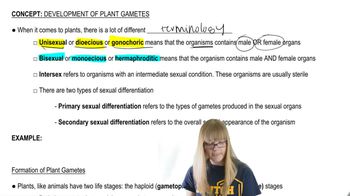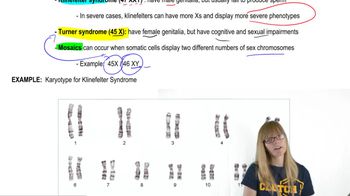Table of contents
- 1. Introduction to Genetics51m
- 2. Mendel's Laws of Inheritance3h 37m
- 3. Extensions to Mendelian Inheritance2h 41m
- 4. Genetic Mapping and Linkage2h 28m
- 5. Genetics of Bacteria and Viruses1h 21m
- 6. Chromosomal Variation1h 48m
- 7. DNA and Chromosome Structure56m
- 8. DNA Replication1h 10m
- 9. Mitosis and Meiosis1h 34m
- 10. Transcription1h 0m
- 11. Translation58m
- 12. Gene Regulation in Prokaryotes1h 19m
- 13. Gene Regulation in Eukaryotes44m
- 14. Genetic Control of Development44m
- 15. Genomes and Genomics1h 50m
- 16. Transposable Elements47m
- 17. Mutation, Repair, and Recombination1h 6m
- 18. Molecular Genetic Tools19m
- 19. Cancer Genetics29m
- 20. Quantitative Genetics1h 26m
- 21. Population Genetics50m
- 22. Evolutionary Genetics29m
3. Extensions to Mendelian Inheritance
Sex Chromosome
Problem 23
Textbook Question
What is the role of the enzyme aromatase in sexual differentiation in reptiles?
 Verified step by step guidance
Verified step by step guidance1
Understand that aromatase is an enzyme that converts androgens (male hormones) into estrogens (female hormones).
Recognize that in many reptiles, sexual differentiation is influenced by temperature-dependent sex determination (TSD), where the incubation temperature of the eggs determines the sex of the offspring.
Acknowledge that aromatase activity can be temperature-sensitive, meaning that at certain temperatures, the enzyme is more active, leading to higher estrogen levels and the development of female characteristics.
Consider that at lower temperatures, aromatase activity might be reduced, resulting in lower estrogen levels and the development of male characteristics.
Conclude that aromatase plays a crucial role in the balance of sex hormones during the critical period of sexual differentiation, influencing whether the developing embryo will become male or female based on the temperature conditions.
Recommended similar problem, with video answer:
 Verified Solution
Verified SolutionThis video solution was recommended by our tutors as helpful for the problem above
Video duration:
1mPlay a video:
Was this helpful?
Key Concepts
Here are the essential concepts you must grasp in order to answer the question correctly.
Aromatase Enzyme
Aromatase is an enzyme that converts androgens, such as testosterone, into estrogens, like estradiol. This conversion is crucial in various biological processes, including sexual differentiation, as it influences the development of sexual characteristics in many species, including reptiles.
Recommended video:
Guided course

DNA Proofreading
Sexual Differentiation
Sexual differentiation refers to the process by which organisms develop male or female characteristics. In reptiles, this can be influenced by genetic factors, environmental conditions, and hormonal levels, with aromatase playing a key role in determining the sex by modulating estrogen levels during critical developmental periods.
Recommended video:
Guided course

Plant Gamete Terminology
Environmental Sex Determination
In some reptiles, sex is determined by environmental factors such as temperature during incubation rather than strictly by genetics. This phenomenon, known as temperature-dependent sex determination (TSD), is influenced by the activity of aromatase, which can be affected by temperature, thereby impacting the balance of sex hormones and ultimately the sex of the offspring.
Recommended video:
Guided course

Sex Determination

 4:24m
4:24mWatch next
Master Sex Determination with a bite sized video explanation from Kylia Goodner
Start learningRelated Videos
Related Practice


